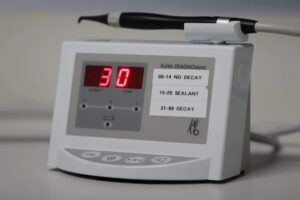What is Diagnodent? How Cutting-Edge Technology Detects Cavities Early

In the world of modern dentistry, the best treatment is often the one you never need, thanks to early detection. Cavities don’t appear overnight, but once they’re visible to the naked eye or show up on traditional X-rays, they’re already well on their way to becoming a bigger problem. That’s where Diagnodent cavity detection comes in.
Rather listen than read? Play this audio for an interactive reading of the blog.
At Merion Village Dental, we’re committed to providing advanced, preventive care that keeps your smile healthier for longer. Diagnodent is one of the standout tools in our toolkit. This innovative laser technology finds tooth decay in its earliest stages—long before it becomes painful, unsightly, or expensive to treat.
Why Early Detection Matters
Cavities begin as small areas of demineralization, soft spots where enamel is starting to break down. Catching them at this stage gives you options: you can often reverse early damage with fluoride treatments, improved oral hygiene, or minimally invasive fillings. Wait too long, and you’re looking at deeper decay, root canals, crowns, or even extractions.
Early cavity detection in Columbus is more than just a luxury; it’s a smart way to preserve your natural teeth, protect your wallet, and avoid dental emergencies.
How Diagnodent Works
So how does Diagnodent work its magic? The system uses a small, handheld laser to scan your teeth. As the laser passes over the enamel, it measures how much light is reflected back. Healthy enamel reflects light differently than decayed areas, even in spots too small or hidden for traditional exams to pick up.
The device gives a numeric reading on a scale from 0 to 99. Lower numbers mean your tooth is in good shape, while higher numbers may indicate early-stage or advanced decay. It’s fast, painless, and incredibly accurate—especially when combined with a traditional visual exam and digital X-rays.
The Technology Behind Diagnodent
Diagnodent operates using a principle called laser fluorescence. Decayed tooth structure emits a different level of fluorescence than healthy enamel when exposed to laser light. This allows the Diagnodent device to detect changes below the surface of the tooth, even when everything looks normal to the human eye.
Here’s why this matters: Traditional methods like dental explorers or bitewing X-rays might miss early-stage decay, especially in pits, fissures, or between teeth. Diagnodent doesn’t rely on guesswork. It gives us a precise, measurable value so we can track subtle changes over time.
Who Benefits Most from Diagnodent?
Diagnodent is ideal for:
- Children and teens who are more prone to cavities and may struggle with brushing effectively.
- Health-conscious adults who want to avoid invasive treatments whenever possible.
- Patients with a history of decay where early detection can prevent repeat problems.
- Anyone with deep grooves in their teeth that are hard to clean and even harder to examine visually.
If you’re someone who values preventive dentistry, Diagnodent is a tool you want in your corner.
What Diagnodent Feels Like
Let’s be honest: dental visits can make people anxious. But Diagnodent isn’t something to worry about. There’s no drilling, no scraping, and no pain. It feels more like your dentist is pointing a penlight at your teeth. Most patients don’t feel a thing and the scan only takes a few minutes.
And if you do have early signs of decay? You’ll be relieved to know we caught it early, and your treatment will be faster, simpler, and more affordable than it would have been six months or a year from now.
Why We Use Diagnodent at Merion Village Dental
We invest in technology that helps our patients stay healthy, not just patch up problems after the fact. Diagnodent is a perfect fit for our philosophy: treat small issues before they become big ones, and help every patient keep their natural teeth as long as possible.
Diagnodent cavity detection is just one way we’re raising the bar for preventive dentistry in Columbus. It pairs beautifully with our digital X-rays, fluoride treatments, sealants, and routine cleanings.
Want to know more about how we protect your smile? Check out our page on preventive services or ask your hygienist about Diagnodent during your next appointment.
FAQs: Diagnodent Cavity Detection
Is Diagnodent Safe For Kids?
Absolutely. Diagnodent uses a low-intensity laser that’s completely safe and painless for patients of all ages.
Can Diagnodent Detect Cavities Between Teeth?
It’s most effective on the chewing surfaces of back teeth, but it can complement X-rays and visual exams for a more complete diagnosis.
How Often Should I Be Scanned With Diagnodent?
We typically use Diagnodent during your regular dental exams, especially if you’re at higher risk for cavities.
Does Diagnodent Replace X-rays?
No, it’s a complementary tool. X-rays are still essential for detecting deeper decay, bone loss, and other issues.
Will My Insurance Cover Diagnodent?
Many insurance plans cover early cavity detection tools as part of a preventive exam. We’re happy to check your benefits before your visit.
Take Advantage of the Latest Dental Technology
Don’t wait until decay becomes a problem you can’t ignore. At Merion Village Dental, we believe in staying ahead of the curve, and ahead of cavities. Diagnodent allows us to detect problems early and treat them before they turn into something serious.
Modern Technology That Protects Your Smile
Schedule your next dental exam with Merion Village Dental and experience the benefits of Diagnodent cavity detection for yourself.
Related Posts:
Recent Posts
- What is Diagnodent? How Cutting-Edge Technology Detects Cavities Early
- How Sedation Dentistry Can Help You Overcome Dental Anxiety
- Wisdom Teeth Removal: What to Expect and When It’s Time to Act
- Why Does My Jaw Hurt? Causes, Treatments, and When to See a Dentist
- How to Easily Tell if a Dentist is Accepting New Patients
Archives
- April 2025
- March 2025
- February 2025
- January 2025
- December 2024
- November 2024
- October 2024
- September 2024
- August 2024
- July 2024
- April 2024
- March 2024
- February 2024
- December 2023
- September 2023
- July 2023
- January 2023
- November 2022
- October 2022
- September 2022
- August 2022
- May 2021
- March 2021
- February 2021
- January 2021
- October 2020
- May 2020
- November 2017
- October 2017
- August 2017
- July 2017
- June 2017
- May 2017
- March 2017
- February 2017
- January 2017
- December 2016
- November 2016
- October 2016
- September 2016
- July 2016
- June 2016
- May 2016
- March 2016
- February 2016
- December 2015
- November 2015
- October 2015
- September 2015
- August 2015
- June 2015
- May 2015
- April 2014
- March 2014
- January 2014
